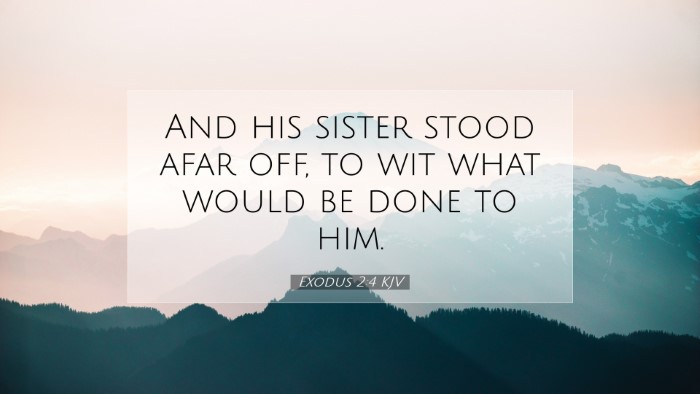Exodus 2:4 Commentary
Verse Context: Exodus 2:4 states, “And his sister stood afar off, to wit what would be done to him.” This verse requires an understanding of the broader narrative involving Moses, his birth, and the events leading to his eventual salvation from Pharaoh’s decree.
Overall Significance
This verse gives insight into the protective instinct of Moses’ family and sets the stage for God's providence in his life. The act of Moses' sister observing from a distance speaks to the theme of divine intervention and human agency in the midst of peril.
Insights from Public Domain Commentaries
Matthew Henry's Commentary
Henry emphasizes the faith displayed by Moses' family during desperate times. He points out that Miriam, his sister, showed courage amidst danger. Her role as a watcher signifies an act of faith; despite the grave threat from Pharaoh, she remains observant and hopeful. Henry notes, “It is a commendable thing for children to take care of their younger siblings, especially in situations where parental guidance seems perilous.”
Albert Barnes' Notes on the Bible
Barnes elaborates on the importance of the family structure in this passage, noting the supportive role of Miriam. He highlights that the act of watching signifies a deeper spiritual vigilance and reliance on divine providence. He states, “Miriam’s position is indicative of the watchfulness that Christians should maintain in observing the unfolding of God’s plans, even when they seem hidden.” This understanding provides a framework for believers to remain attentive in their faith journeys.
Adam Clarke's Commentary
Clarke takes a more personal approach by reflecting on the emotional dynamics involved in Miriam's actions. He notes that her concern showcases a sister’s love and the natural instinct to protect. Clarke states, “Miriam’s watchful eye is an encouragement to families, underscoring the necessity of seeking God’s protection for their loved ones.” He encourages readers to reflect on their roles in safeguarding one another in faith.
Theological Implications
- Divine Oversight: The observance of Miriam is a testament to God's oversight in human affairs. As she watches, the narrative unfolds under divine guidance, which offers assurance to believers that God is always at work.
- Family and Community: This passage underscores the significance of familial bonds and community in faith. The involvement of Moses' family illustrates how collective support plays a crucial role in nurturing future leaders in faith.
- Faithfulness Amid Trials: The act of watching can be seen as a metaphor for maintaining faith during trials. Believers are called to remain vigilant and hope-filled, reflecting Miriam’s posture of waiting on the Lord.
Applications for Pastors and Scholars
As pastors and scholars study this verse, they are encouraged to explore the themes of protection, vigilance, and divine providence. The story of Moses’ early life encapsulates the tension between human action and God’s sovereign will.
For Pastors: This commentary can serve as a useful reminder during teachings about the role of family in God’s plan. Pastors can encourage congregations to engage in prayerful watching over their loved ones, taking Miriam’s role as a model for guardianship in faith.
For Scholars: The depth of this passage offers a fruitful avenue for theological exploration. Scholars can analyze how familial dynamics play crucial roles in biblical narratives and guide discussions on how these principles are applicable in contemporary ministry contexts.
Conclusion
Exodus 2:4 presents a rich tapestry of human emotion, divine providence, and familial responsibility. The commentaries from Henry, Barnes, and Clarke collectively highlight the intricate balance of faith and action, encouraging believers to actively engage in observation and prayer, fostering a community steeped in vigilance and support.


